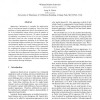223 search results - page 2 / 45 » Least-Squares Temporal Difference Learning |
NIPS
2001
13 years 5 months ago
2001
We propose a new approach to reinforcement learning which combines least squares function approximation with policy iteration. Our method is model-free and completely off policy. ...
ICML
2009
IEEE
14 years 5 months ago
2009
IEEE
We consider the task of reinforcement learning with linear value function approximation. Temporal difference algorithms, and in particular the Least-Squares Temporal Difference (L...
PKDD
2009
Springer
13 years 11 months ago
2009
Springer
The goal of approximate policy evaluation is to “best” represent a target value function according to a specific criterion. Temporal difference methods and Bellman residual m...
SIBGRAPI
2009
IEEE
13 years 11 months ago
2009
IEEE
Appearance information is essential for applications such as tracking and people recognition. One of the main problems of using appearance-based discriminative models is the ambig...
NIPS
1998
13 years 5 months ago
1998
Lazy learning is a memory-based technique that, once a query is received, extracts a prediction interpolating locally the neighboring examples of the query which are considered re...

